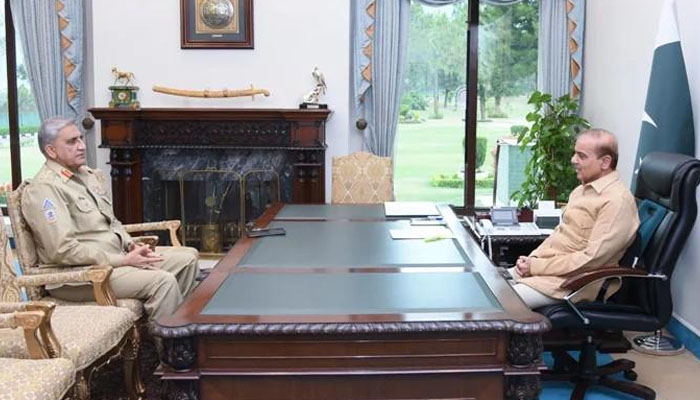PM Shahbaz Sharif gave permission to COAS to speak to US administration on IMF
Prime minister and the army chief had a discussion on the economic situation, says a source
ISLAMABAD: Chief of the Army Staff General Qamar Javed Bajwa recently approached the US administration with the explicit permission of Prime Minister Shehbaz Sharif for an early disbursement of funds from the International Monetary Fund (IMF).
An informed government source told The News that the prime minister and the army chief had a discussion on the economic situation and during the same discussion, certain measures were agreed to be taken. Besides other measures, it was proposed that the army chief should also talk to the US administration with the request to use its influence for the early disbursement of IMF funds to Pakistan.
The prime minister permitted the army chief, who after speaking to the US authorities, reported the matter back to the premier. The source said that the civil-military leadership also discussed other options of how to secure the country’s economy from getting into a crisis-like situation.
Contacting the US administration was one of the different options that the Pakistani authorities are pursuing to meet the economic challenges of the country. According to a recent international media report, General Qamar Javed Bajwa telephoned US Deputy Secretary of State Wendy Sherman and appealed to her to expedite the $1.2 billion disbursal by the IMF.
The move by the army chief comes as Pakistan faces a worsening economic crisis due to dwindling foreign reserves. This is, however, not the first time that the government has approached the administration of President Joe Biden to restore the $6 billion loan programme.
Federal Finance Minister Miftah Ismail had met the US envoy in Islamabad seeking the US government’s influence over the IMF in reviving the bailout package.
The country reached a staff-level agreement with the lender earlier this month but the delay in disbursement has put pressure on the country’s faltering economy amid a deepening political crisis.
As per reports, the IMF’s board meeting is expected in the third week of August and the pressure on the local currency has sparked a debate about whether Pakistan could default. Pakistan agreed to take some very tough measures in order to revive the stalled IMF programme, removing subsidies on petroleum products, hiking power and gas tariffs and increasing taxes.
These steps have taken a toll on the common man but the delay in the funds’ transfer has made jittery the financial markets with the rupee has slid to the historic low in the interbank market, trading at around 240 to a dollar.
The Shehbaz Sharif-led government has been making hectic efforts to restore investor confidence but all the attempts have so far failed to bring stability. It is relevant to mention here that the National Security Policy drafted and approved during Imran Khan’s tenure recognises the economic security as a lynchpin to the country’s national security.
-
 Teyana Taylor Reveals What Lured Her Back To Music After Earning Fame In Acting Industry
Teyana Taylor Reveals What Lured Her Back To Music After Earning Fame In Acting Industry -
 Prince William Shows He's Ready To Lead The Monarchy Amid Andrew Scandal
Prince William Shows He's Ready To Lead The Monarchy Amid Andrew Scandal -
 Lux Pascal Gushes Over Role In Tom Ford's 'Cry To Heaven': 'I Just Wanted To Be Part Of This Picture'
Lux Pascal Gushes Over Role In Tom Ford's 'Cry To Heaven': 'I Just Wanted To Be Part Of This Picture' -
 Near-blind Refugee Found Dead In Buffalo After Release By US Border Patrol
Near-blind Refugee Found Dead In Buffalo After Release By US Border Patrol -
 Firm Steps In Forcing Andrew’s Hand: ‘Can No Longer Keep A Promise'
Firm Steps In Forcing Andrew’s Hand: ‘Can No Longer Keep A Promise' -
 Kenyan Man Accused Of Recruiting Men To Fight In Ukraine
Kenyan Man Accused Of Recruiting Men To Fight In Ukraine -
 'The Wrong Paris' Star Veronica Long Shares What New Crime Series 'Blue Skies' Is About
'The Wrong Paris' Star Veronica Long Shares What New Crime Series 'Blue Skies' Is About -
 King Charles Remains Immersed In Work Amid Andrew Scrutiny
King Charles Remains Immersed In Work Amid Andrew Scrutiny -
 Bobby J. Brown's Passing Adds To Growing List Of Celebrity Deaths In 2026
Bobby J. Brown's Passing Adds To Growing List Of Celebrity Deaths In 2026 -
 Prince William Fears For Andrew's Mental Health
Prince William Fears For Andrew's Mental Health -
 Paige DeSorbo Breaks Silence On New Relationship With Joe D'Amelio
Paige DeSorbo Breaks Silence On New Relationship With Joe D'Amelio -
 'Marshals' Showrunner Reveals If Kayce And Beth Will Cross Paths In 'Yellowstone' Spinoff
'Marshals' Showrunner Reveals If Kayce And Beth Will Cross Paths In 'Yellowstone' Spinoff -
 Belgium Watchdog Launches Antitrust Probe Into Google Ads Business
Belgium Watchdog Launches Antitrust Probe Into Google Ads Business -
 Andrew Ready To Fight Back: 'He's Very Vengeful'
Andrew Ready To Fight Back: 'He's Very Vengeful' -
 After Surpassing 100 Million YouTube Subscribers, BLACKPINK Returns With New Release
After Surpassing 100 Million YouTube Subscribers, BLACKPINK Returns With New Release -
 Rihanna Sends Fans Into Frenzy With BTS Footage Of Music Making: Watch
Rihanna Sends Fans Into Frenzy With BTS Footage Of Music Making: Watch




